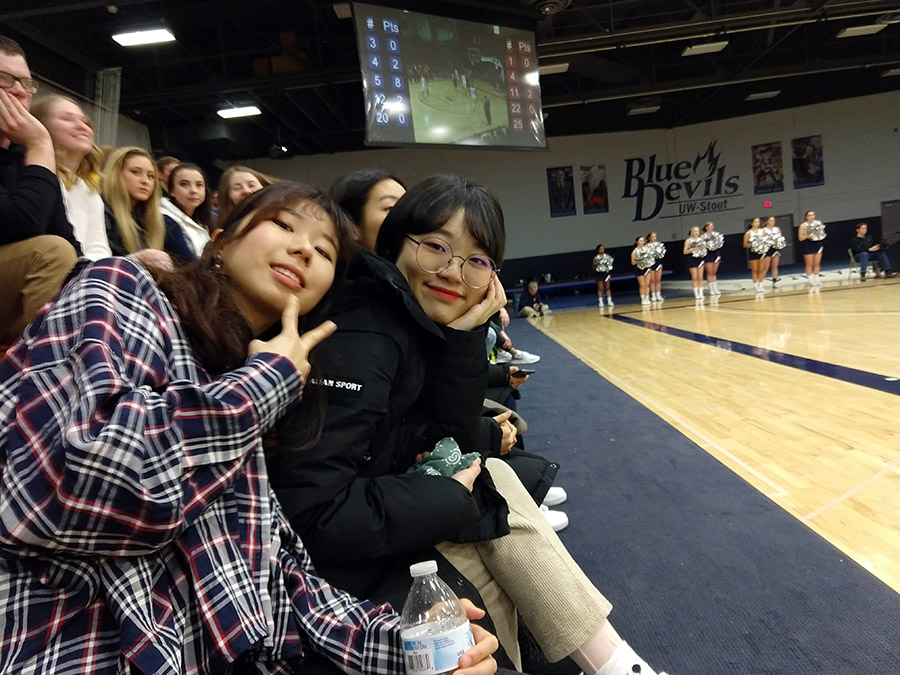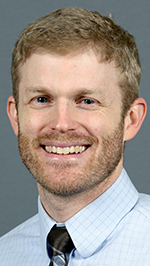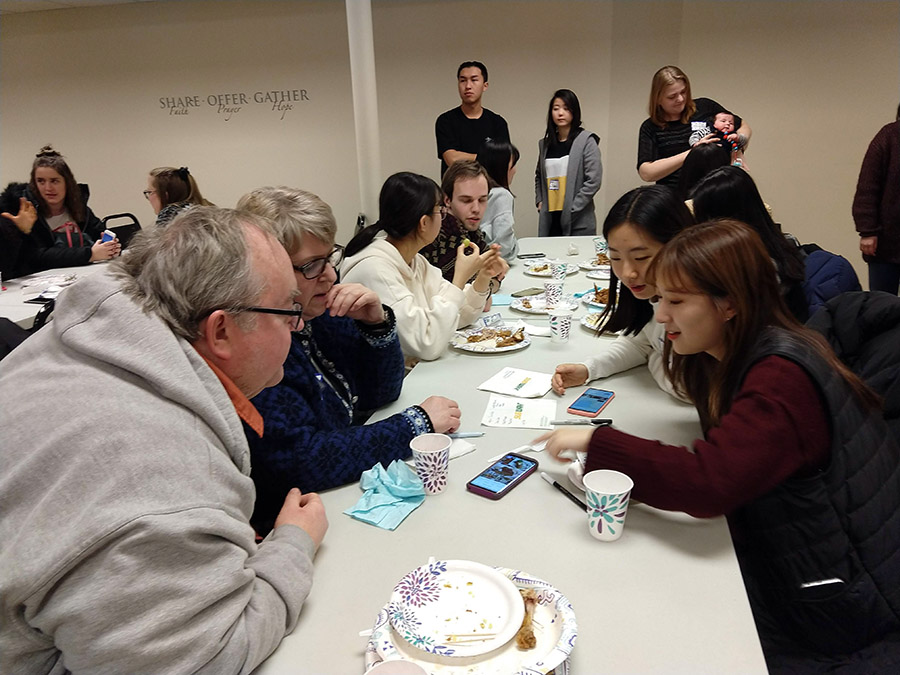The cold temperatures and snowfalls of Wisconsin’s winter left a definite impression with 36 South Korean students visiting University of Wisconsin-Stout.
The students came from Sangmyung University in Seoul and Ajou University in Suwon, about 19 miles south of Seoul, from Jan. 20 to Feb. 17 as part of the Winter in the Midwest program.
UW-Stout also offers a Summer in the Midwest program. Last summer 36 students from four countries and one U.S. territory visited for two to four weeks. Plus, UW-Stout typically has 200 or more international students each fall and spring semester.
Haneul Yoo of Ajou University was surprised by the footprint of UW-Stout’s campus. “The city is very spacious,” Yoo said. “Korea is very crowded.”
One of her favorite activities was a potluck with community members. “There is nothing like that in Korea,” Yoo said. “People are so busy in Korea. It’s hard to meet your neighbor. It was great to meet people who live in Menomonie.”
Yoo said she was interested in traveling to the U.S. to learn more about the country and improve her English skills. “Exchanges help us to understand each other,” Yoo said. “The world is becoming so global. It’s good to learn the etiquette.”
Kang Ji Eun of Ajou University was impressed by the snowy weather. “We maybe have a one-time snow a year,” she said. “It is not a lot of snow. It’s so cold here too.”

She also enjoyed seeing a UW-Stout basketball game. “It was fun to me,” she said.
Eun took part in the exchange at the urging of her mother. “My mother wanted me to learn more English,” Eun said. “She wanted me to come there to a country to use my English.”
Suji Kim of Sangmyung University said she enjoyed meeting people from a smaller city. “I wanted to experience learning in the U.S.,” she said. “It’s real life rather than learning English in Korea. I want to improve my English, my real English skills.”
Learning in and out of the classroom
The South Korean students took polka dance lessons from the UW-Stout Swing Dance Club and had the opportunity to take part in the Snow Ball, Frost Fair and Polar Plunge. They also worked with students talking about Korean poetry in an American Multicultural Literature class.
Kristyn Blessing, English as a Second Language Institute, recently taught a class to the South Korean students, talking about art in the Midwest. The students saw American art at the Menomonie Co-op, UW-Stout’s Harvey Hall and the Raw Deal. The students talked about art in Wisconsin including chainsaw, cheese and butter sculptures.
“I think this is enriching for students from both cultures,” Blessing said. “The students from Stout learn more about other cultures, art and history and get a chance to connect.”
The UW-Stout and Menomonie communities have been amazingly welcoming to the students, Blessing said. Professors have welcomed them to visit classes.
“Professors Joleen Hanson, Leni Marshall, Justin Nicholes and Mary Spaeth have partnered with us to include our student visits as integral parts of their courses,” she said. “The Career Center, Counseling Center, Student Health Services and library have welcomed them to visit their offices, and student organizations like the Hmong Student Association have jumped at the chance to share the Hmong history in the area.”
The Stout Student Association arranged several events, including a K-pop party in the Memorial Student Center, and students have been welcomed to dinner in local homes. “Whenever I want to organize something, there is always someone eager to be involved. I am so thankful that UW-Stout and Menomonie have shown the students such warmth,” Blessing said.
At a poster presentation, students compared aspects of Korean, U.S. and Saudi Arabian cultures.
 Scott Pierson, director of the Office of International Education, said short-term international programs are on the rise in higher education. “This trend is happening for a variety of reasons, but cost and duration are the largest factors; it is more convenient and cost-effective to fit a study abroad experience into one’s degree program if it happens during a winter or summer break period,” Pierson said. “These programs are becoming more important as they offer some of the benefits of a longer-term experience in a condensed format.”
Scott Pierson, director of the Office of International Education, said short-term international programs are on the rise in higher education. “This trend is happening for a variety of reasons, but cost and duration are the largest factors; it is more convenient and cost-effective to fit a study abroad experience into one’s degree program if it happens during a winter or summer break period,” Pierson said. “These programs are becoming more important as they offer some of the benefits of a longer-term experience in a condensed format.”
In South Korea, the winter break period is from December through March, Pierson added. The Winter in the Midwest dates coincide with the start of the university spring term this year.
“As a result, South Korean students have been able to meet UW-Stout students while the semester is in session,” Pierson added. “A great deal of cross-cultural sharing has taken place, allowing students from Wisconsin and South Korea to compare and contrast, learn and embrace different perspectives and traditions. Lifelong friendships have been formed and language skills have improved. Many have expressed interest in returning to UW-Stout on a semester or yearlong exchange.”
Pierson hopes UW-Stout students consider studying at one of the new South Korean partner institutions. UW-Stout has formalized exchange agreements with Ajou University, Sangmyung University, Chung-Ang University and Korea University Sejong Campus.
Several partnerships have scholarships available for UW-Stout students, which can cover airfare and room and board, mitigating the greatest barrier to study abroad, cost, Pierson said. “Courses are offered in English-language medium from a variety of common academic disciplines, meaning our students do not need to be proficient in Korean to participate,” he noted.
UW-Stout is Wisconsin’s Polytechnic University, with a focus on applied learning, collaboration with business and industry, and career outcomes.
###
Photos
The South Korean students attend a UW-Stout basketball game as part of Winter in the Midwest, a cultural and educational exchange.
Scott Pierson
One of the students’ favorite parts of their trip was meeting Menomonie community members during a potluck.




